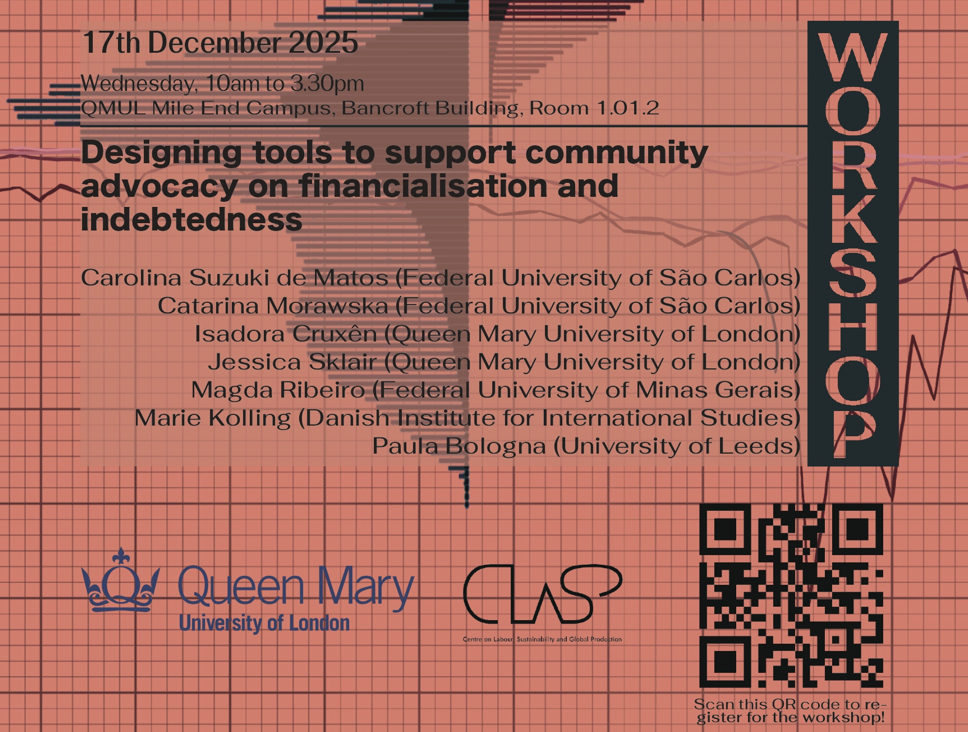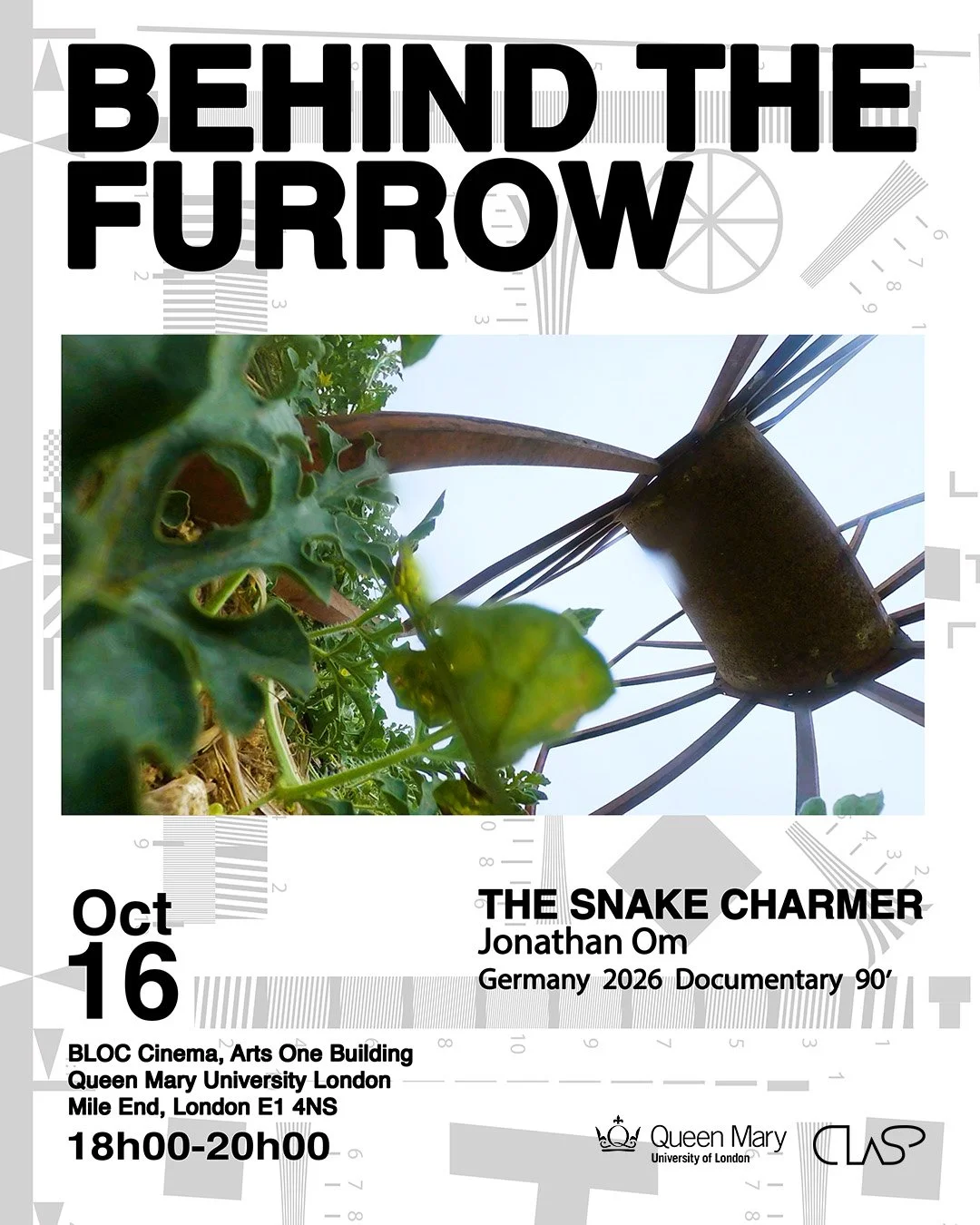EVENTS
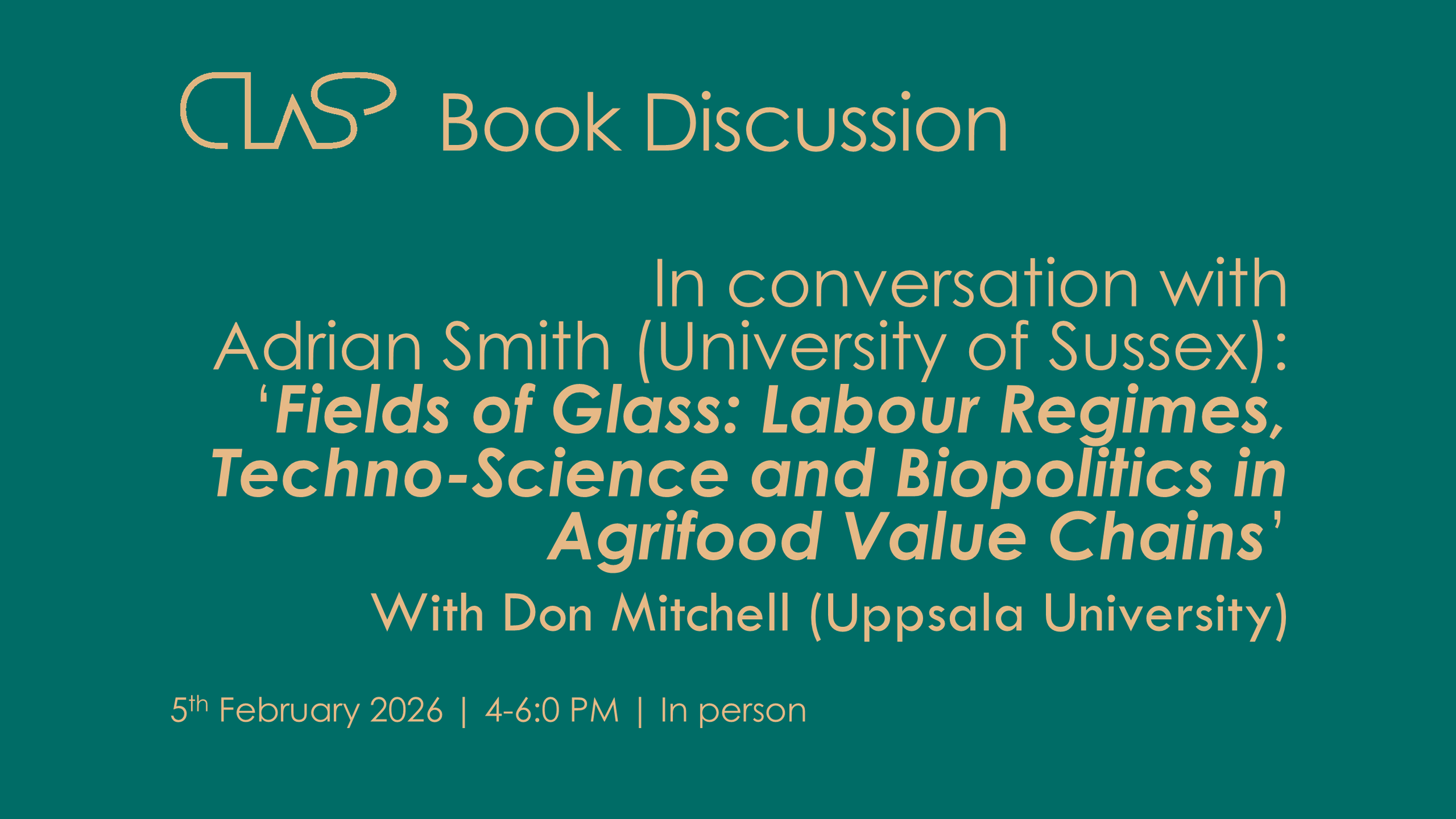
Book Discussion: ‘Fields of Glass: Labour Regimes, Techno-Science and Biopolitics in Agrifood Value Chains’
CLaSP invites you for a discussion on the book Fields of Glass: Labour Regimes, Techno-Science and Biopolitics in Agrifood Value Chains
Author Adrian Smith (University of Sussex) will be in conversation with Don Mitchell (Uppsala University).
Fields of Glass examines the relationships between technology and labour regimes in agrifood value chains. It seeks to formulate new perspectives that bridge the hitherto distinct worlds of value chain research, agrarian political economy, labour regime theory, and agrarian techno-science to explain the enduring insecurity of food systems in the United Kingdom. Drawing upon both historical and contemporary research, the book explores how the precarity and exploitation of migrant labour intersects with ecology and techno-science, and the governance of innovation, in the forms of hydroponic and digital technologies, to explain the development and changing nature of work in glasshouse agrifood value chains in the UK.
Adrian Smith is Professor of Management at the University of Sussex Business School where he is also Associate Dean (Research and Innovation). His research is on labour and global production systems, and he is currently researching labour regimes and digital technologies in agri-food value chains. He is a research co-lead at the ESRC Centre for Digital Futures at Work, co-Editor in Chief of European Urban and Regional Studies, and was a co-founder of the Centre for Labour and Global Production, the predecessor of CLaSP, at QMUL. His most recent books are Fields of Glass: Labour Regimes, Techno-Science and Biopolitics in Agrifood Value Chains; Labour Regimes and Global Production (edited with Elena Baglioni, Liam Campling and Neil Coe); Free Trade Agreements and Global Labour Governance (with James Harrison, Liam Campling, Ben Richardson, and Mirela Barbu).
Don Mitchell is professor of human geography at Uppsala University, Sweden. His research focuses on labor-capital struggles in the making of agribusiness (and now urban) landscapes; the politics of public space and homelessness; the spatiality of law; and spatial theories of justice. He is currently drowning in a deep sea of documents related to the rise and fall of the United Farm Workers and the remaking of California agribusiness between 1960-2000; involved in an international network called “Keep the City Ticking” which examines the shifting labor and migration infrastructures that shape contemporary urban space; completing a book (with Johan Pries and Erik Jönsson) on Sweden’s People’s Parks; and just launching a new research project (led by Marlene Spanger at Aalborg University) on labor relations along the whole “natural wine” supply chain from growing in Sicily, across the logistical networks in Europe, to final consumption in the trendy bars and restaurants of Copenhagen. His most recent books are Landscape, Law, and Justice – 20 Years (edited with Michael Jones, Gunhild Setten, and Amy Strecker); Mean Streets: Homelessness, Public Space, and the Limits to Capital; and Revolting New York: How 400 Years of Riot, Rebellion, Uprising and Revolution Shaped a City (edited, with the late Neil Smith).”

CLaSP Seminar: The intertwining of finance and mining: gold extraction in the Amazon and the global gold market
CLaSP invites you to a seminar titled ‘The intertwining of finance and mining: gold extraction in the Amazon and the global gold market’
Catarina Morawska (Federal University of São Carlos, Brazil) will present her paper and Jessica Sklair (Queen Mary University of London) will act as discussant.
This paper describes the efforts of Canada-based Belo Sun Mining Corp to implement the “Volta Grande do Xingu Gold Project”, expected to become the largest open-pit gold mine in Brazil. The aim is to explore how gold extraction in the Amazon region is intertwined with financial knowledge regimes in the global gold market. Located in the margins of the Xingu river, in Pará state, the project has been surrounded by controversy. Indigenous groups and environmental non-governmental organizations have commissioned independent technical reports from mining specialists to dispute the data produced by Belo Sun on the project’s feasibility, risks and impacts. However, advocacy strategies to question the project in courts and publicly denounce the company's lack of transparency in relation to the project's environmental, social and governance (ESG) have not disrupted trade of its stocks in exchanges in Canada, Germany and the US, where mining is still seen as an opportunity to diversify financial portfolios. An ethnography of the Volta Grande do Xingu Gold Project highlights the intertwining of the worlds of mining and finance, with the opening of pits and the opening of financial opportunities as two intrinsically associated practices. I argue that the indigenous critique of Belo Sun foregrounds what is left obliterated by both the company’s executives and investors: the impact of extracting gold on a river whose high and low flows maintain life in the Xingu region.
PLEASE NOTE: We will circulate Catarina's paper draft for pre-reading two weeks before the seminar - please get in touch if you would like to receive it on j.sklair@qmul.ac.uk
Speaker bio:
Catarina Morawska is Associate Professor of Social Anthropology at the Federal University of São Carlos (UFSCar) in Brazil and Visiting Academic at Queen Mary University of London. She coordinates the Laboratory of Ethnographic Experimentations, a research group interested in the ethnographic challenges of co-writing with activists a critique of the geopolitics of technofinancial capitalism. Her long term engagement with grassroots organizations in Pernambuco has been reflected in her work, mainly published in Portuguese, on the methodological implications of partnering up with social movements to decolonise knowledge production.
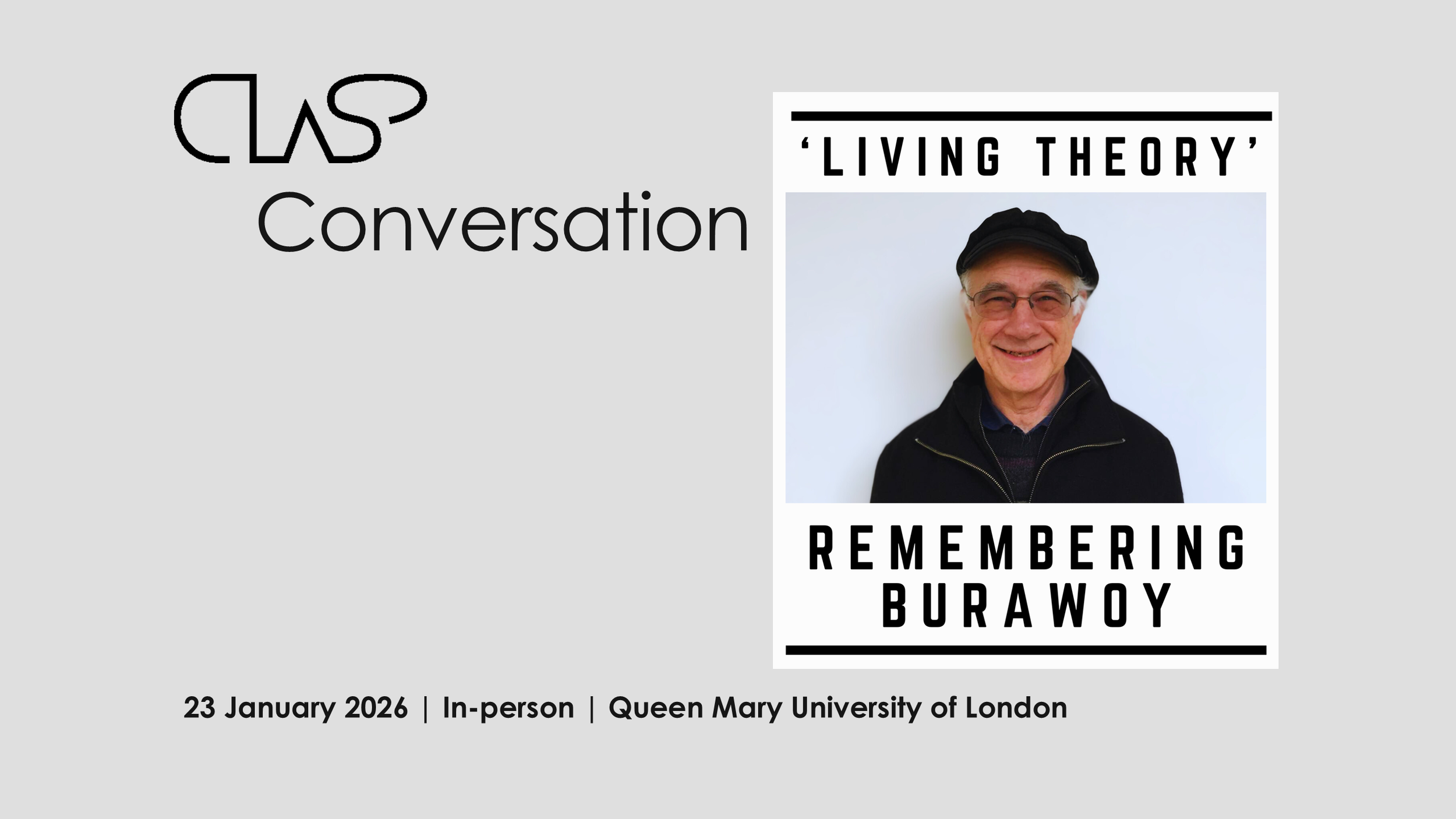
CLaSP Conversation- ‘Living theory’: Remembering Burawoy
CLaSP invites you to a conversation titled ‘Living theory’: Remembering Burawoy in the memory of Michael Burawoy.
Speakers: Chris McLachlan (QMUL), Liam Campling (QMUL) and Shray Mehta (Northumbria University).
Michael Burawoy was tragically killed in a hit and run near his home in Oakland, California, USA on 3rd February 2025. His death shocked the academy, and the world over. He was a leading international sociologist in the Marxist tradition, though his work extended to many adjacent disciplines including industrial relations, political economy and global development. The influence of his contributions to these fields of study are timeless, the relevance of which have endured and cannot be understated: his death is a great loss.
CLaSP is hosting this event to honour the work of Michael Burawoy. For CLaSP, Burawoy has been influential in developing research projects around labour regimes, worker power, class and the ethnographic method. His work was also essentially international in its character, with his studies on labour regimes spanning an analysis of workplaces in the United States, Hungary, Russia and Zambia. These analyses were not only limited to theoretical advancement, but drew on his own experiences as a worker at such factories through his extended case method. In particular, his landmark works of Manufacturing Consent and The Politics of Production were critical to his broader research programme that centred the micro-processes of the workplace as the mechanism through which surplus value was ‘secured and obscured’ under capitalism. For Burawoy, it was these relations in production, rather than of production, that conditioned workers’ subjective experiences of the labour process. Burawoy was also notable for his Public Sociology (heading the American Sociological Association and the International Sociological Association), compelling sociologists and academics more broadly to engage in wider dialogues around social justice and global inequality: his committment to sociology as a moral and political project always sought to extend solidarity to those most affected by exploitation.
This event kicks off with three speakers discussing the influence of Burawoy in their own work, before moving to a wider discussion on his ongoing legacy.
Speaker bios: Chris McLachlan is Senior Lecturer in HRM at the School of Business and Management at QMUL, Liam Campling is Professor of International Business and Development at the School of Business and Management at QMUL, and Shray Mehta is Leverhulme Trust Early Career Fellow, Faculty of Society and Culture at Northumbria University.

Seminar + Workshop- Debt by design: Opacity, automation, and inequality in Brazil’s credit and fintech industry
PLEASE NOTE: THIS IS A TWO PART EVENT; A SEMINAR ON DAY 1 (16 DECEMBER) FOLLOWED BY A WORKSHOP ON DAY 2 (17 DECEMBER). DETAILS FOR BOTH ARE BELOW.
CLaSP SEMINAR: 16 December (4-6 PM)
Debt by design: Opacity, automation, and inequality in Brazil’s credit and fintech industry with Dr Marie Kolling (Danish Institute for International Studies)
Brazil’s ‘fintech revolution’ has propelled the expansion of the digital economy and advanced financial inclusion, increasing access to consumer credit but also sparking record-high levels of household debt. Through multi-perspective fieldwork among women burdened by debt and professionals in the credit and fintech industry, the article examines three dimensions of opacity: (i) automated scoring models, (ii) flexible credit scoring criteria, and (iii) discretionary information in credit offers. The entrenchment of opacity generates a grey zone that limits women’s ability to assess and contest offers while myths thrive about how to navigate digital finance and improve creditworthiness. The insights challenge a narrative of financial education as a remedy to indebtedness, as deliberate information asymmetries forge debt by design.
NOTE: THE SEMINAR WILL BE FOLLOWED BY A WORKSHOP ON THE NEXT DAY, 17TH DECEMBER. PLEASE SEE BELOW FOR WORKSHOP DETAILS.
CLaSP WORKSHOP: 17 December (10AM-330PM)
Designing tools to support community advocacy on financialisation and indebtedness
Please scan here to register for this workshop!
Financial speculation has spread at unprecedented levels across the globe in recent years. In Brazil, the expansion of the credit market has triggered a debt crisis, leading the government to launch a debt renegotiation programme targeting 32 million people. The United Nations has recognised the threat posed to human rights by escalating levels of indebtedness, and in Brazil and elsewhere, civil society organisations are urgently calling for action. Drawing on learning from Brazil, this workshop will ask how data on credit and the effects of indebtedness can be put to use, to widen awareness on financialisation, debt and its drivers in different contexts. We will discuss existing data and debates on financialisation, and explore prototypes for the design of impact tools and advocacy strategies for resistance to debt.
Workshop programme:
10am-10.15am: Welcome and Coffee
10.15am-11.30am: Roundtable: Financialisation in the public debate
Moderator: Marie Kolling (DIIS)
Participants: Jessica Sklair (Queen Mary University of London) & Magda Ribeiro (Federal University of Minas Gerais)
11.30am – 11.45am: Break
11.45am - 1pm: Roundtable: Integrating quantitative and qualitative data for social impact
Moderator: Jessica Sklair (QMUL)
Participants: Catarina Morawska (Federal University of São Carlos), Isadora Cruxên (Queen Mary University of London) & Paula Bologna (University of Leeds)
1pm – 2pm: Lunch
2pm - 3.30pm: Tools for Impact: Producing a prototype
Marie Kolling (Danish Institute for International Studies) & Carolina Suzuki de Matos (Federal University of São Carlos)

A new moment for industrial strategies? BYD, industrial policy and EV production networks in South America
CLaSP invites you for a lunch-time seminar on EV manufacturing and industrial policy in South America with Felipe Irarrázaval, Universidad de Chile
The contemporary turmoil of the global economy, in tandem with the climate crisis, is driving the creation and reconfiguration of global production networks linked to the pivotal technologies of the energy transition. Peripheral states are crafting policy interventions to improve their positions within these networks. This talk presents new research on how resource-rich South American countries seek to strategically position themselves in relation to the electric vehicle industry. Focusing on the case of BYD—the world’s largest electric vehicle manufacturer—we analyze how governments in Chile and Brazil have attempted to create and capture value by aligning regional assets such as natural resources, industrial capabilities, and policy frameworks with the firm’s global strategies.
Felipe Irarrázaval is an Assistant Professor at the Faculty of Government, Universidad de Chile. His research focuses on the intersection of global production networks, political economy, and resource governance in the context of the energy transition, with particular attention to critical minerals in South America.

Book Talk: Traders, Speculators, and Captains of Industry: How Capitalist Legitimacy Shaped Foreign Investment Policy in India
CLaSP invites you for a discussion on the book ‘Traders, Speculators, and Captains of Industry: How Capitalist Legitimacy Shaped Foreign Investment Policy in India (Harvard University Press, 2025)’. This is event is co-supported by QM South Asia Forum and the Centre for the Study of Race, Class and Empire.
Author Jason Jackson (MIT) with discussants Noam Maggor (QMUL) and Tirthankar Roy (LSE)
Is foreign capital an agent of economic growth in developing countries or a vehicle of extraction? Examining how Indian elites wrestled with this question in the late colonial and postcolonial periods, Jason Jackson argues that it reflects a false binary. Instead of simply choosing between domestic and foreign capital, Indian policymakers have long considered the business ethics of individual firms. Indian economic nationalism, in other words, has never been characterized by a straightforward preference for domestic over foreign capital.
Jackson demonstrates that Indian policymakers have sought to favor firms that they believe are most likely to advance industrial development and societal progress at home. In particular, official policy and discourse have sought to confer a kind of moral legitimacy on businesses that invest their profits in local professional development and technological innovation—practices deemed synonymous with economic modernization. Meanwhile, firms seen as simply trading rather than producing, or as engaging in financial speculation and other allegedly regressive activities, have been viewed unfavorably. Jackson argues that these moral categories of capitalist legitimacy have shaped policymaking from the demise of the East India Company and rise of a new class of Indian industrialists in the late nineteenth century; to clashes between companies including Coca-Cola, Thums Up, Hero, and Honda in the twentieth; to more recent efforts to centralize political power through controversial market-governance projects.
An incisive look at the contested terms of capitalist self-interest and business ethics, Traders, Speculators, and Captains of Industry sheds new light on debates over investment policy and state-market relations in a global economy.
Jason Jackson is Associate Professor of Political Economy and Director of the Political Economy Lab at the Massachusetts Institute of Technology.

Finance Capital, the State and Politics
CLaSP invites you for a seminar on finance capital, the state, and politics
It's undeniable that the actions of states, multilateral organizations, and local governments globally and over the last few decades have often privileged the interests of finance capital. From widespread financial deregulation, to austerity, to various schemes to 'derisk' private investment into clean energy or development projects, regulators often appear to act as handmaidens to financiers. Critical work on these trends has mapped a range of important consequences of such measures, including widening inequalities, deepening financial volatility, and the steady erosion of state capacity and policy space.
Important questions about why states have tended to adopt these kinds of measures, though, have generally been paid much less attention. The arguably dominant critical narrative attributes these state actions to a tendency towards 'financialization'—the dominance of finance capital over ever-wider areas of social life. States privilege the interests of finance because they are dominated by finance capital. Drawing on examples around efforts to mobilize private finance for development, I show how such narratives misinterpret the nature of financial power and capitalist statecraft. States have absolutely fostered financial accumulation, but not always deliberately, and not necessarily because they are captured by financial interests. Rather, the continued recourse to fostering financial accumulation reflects the fact that in many circumstances states have few levers with which to address the social and ecological contradictions wrought by global capital accumulation.
Nicholas Bernards is Reader in Global Sustainable Development at the University of Warwick. He is author, most recently, of Fictions of Financialization: Rethinking Speculation, Exploitation, and Twenty-First Century Capitalism (Pluto, 2025).

BEHIND THE FURROW: Film Screening and discussion with Jonathan Om
CLaSP invites you for a preview screening and discussion of a documentary film by Jonathan Om.
Israel’s frontier agriculture is inextricable from colonial violence, especially in the region surrounding the Gaza Strip, and Thai migrant workers labouring on farms in the region are cruelly exposed to the repercussions. Filmmaker Jonathan Om has been collaborating with Thai migrants in the border region on a cinematic project sketching the deep connections between agriculture and militarism since 2021, continuing through the Hamas attack of October 2023 and the genocidal war on Gaza which has followed.
Join us for a preview screening of this work in progress, The Snake Charmer (Germany, 2026), and a discussion between the filmmaker and anthropologist Matan Kaminer (CLaSP, QMUL), author of Capitalist Colonial: Thai Migrant Workers in Israeli Agriculture (Stanford, 2024).
Jonathan Om is an artist and filmmaker who explores various relations to power through projects that transpire at the intersection of creativity and emergency. Om has participated in exhibitions and screenings at various art spaces and film festivals and was an artist in residence in Greenland, Denmark, Austria, Germany and Israel/Palestine.
PLEASE NOTE: This event requires registration due to limited space in the cinema. Kindly register using this link.

Book Discussion with Ariel Salleh on her new book ‘Decolonize Ecomodernism!’
Decolonize Ecomodernism

Materialities of AI: Labour, Ecology and Inequalities at the Technological Frontier
Public debate on artificial intelligence is marked by hopes and fears around the possibility of artificially generated human-like intelligence, extraordinary economic growth prospects, mass technological unemployment, and worsening environmental pressures. Tech industry representatives herald a faster, more productive and dematerialised future, powered by data capture and processing. Governments are increasingly speaking of the importance of responsible or ethical AI, and how to regulate to these ends.
Yet these discourses often mask the material nature of AI. This includes the labour that takes place within AI value chains, composed of millions of workers worldwide, as well as the critical mineral, energy, and water resources required to produce chips, power data centres, and keep servers cool. AI-supported performance analysis is also driving the surging efficiency of fossil fuel extraction. The gendered and racialised effects of AI materialise at and across borders and through bureaucracies as private and public actors profile, surveil, and govern different populations. Increasingly, researchers are identifying and analysing such socio-ecological, exclusionary, and extractive features of AI, as well their accompanying power relations. In doing so, ways of imagining AI otherwise – how it operates, and for whom – are emerging to challenge the status quo.
Engaging with these issues, the 2025 End-of-year event of the Centre on Labour Sustainability and Global Production (CLaSP) will focus on the multi-faceted materialities of AI, seeking to ground the analysis of this technology in its social, ecological and infrastructural dimensions. The event will include presentations that address these hidden landscapes of AI, their costs to workers and the environment, and the possibilities for countering dominant forms of AI production. It will also host a workshop to consider how researchers can, and should, endeavour to centre these aspects of AI, through participatory methods, critical pedagogy, and worker-led inquiry.
The event will be held over two days at Queen Mary University of London in May 2025.
Invited participants:
Prof. Kate Crawford, USC Annenberg, author of Atlas of AI
Dr James Muldoon, University of Essex, co-author of Feeding the Machine
Dr Ana Valdivia, Oxford Internet Institute, University of Oxford
Schedule
28 May - Graduate Centre 201 and Peston Lecture Theatre
2.00-3.30pm - Opening panel: ‘On the Materialities of AI’, Ana Valdivia & James Muldoon (GC201)
Break - Tea, coffee, refreshments
4.00-5.00pm - Keynote talk, Kate Crawford (Peston LT)
5.00pm - Drinks reception (Graduate Centre Foyer)
29 May - Graduate Centre 201 - Politics and methodologies for studying the Materialities of AI and Datawork
2.00-3.00pm - Roundtable with Ana Valdivia and James Muldoon
Break - Tea, coffee, refreshments
3.30-5.00pm - Participatory Workshop


Never Enough: Artistic Production and the Problem of Raw Material
'Never Enough: Artistic Production and the Problem of Raw Material'

Petrochemical transitions: a dialogue on industrial, geopolitical & sustainability transformations with Alice Mah and Adam Hanieh
Petrochemical transitions: a dialogue on industrial, geopolitical and sustainability transformations
The event brings together two leading scholars – Adam Hanieh and Alice Mah – whose shared focus on the East-East hydrocarbon axis and Asian petrochemical production will offer enlightening perspectives on the global dimensions of a just energy transition.
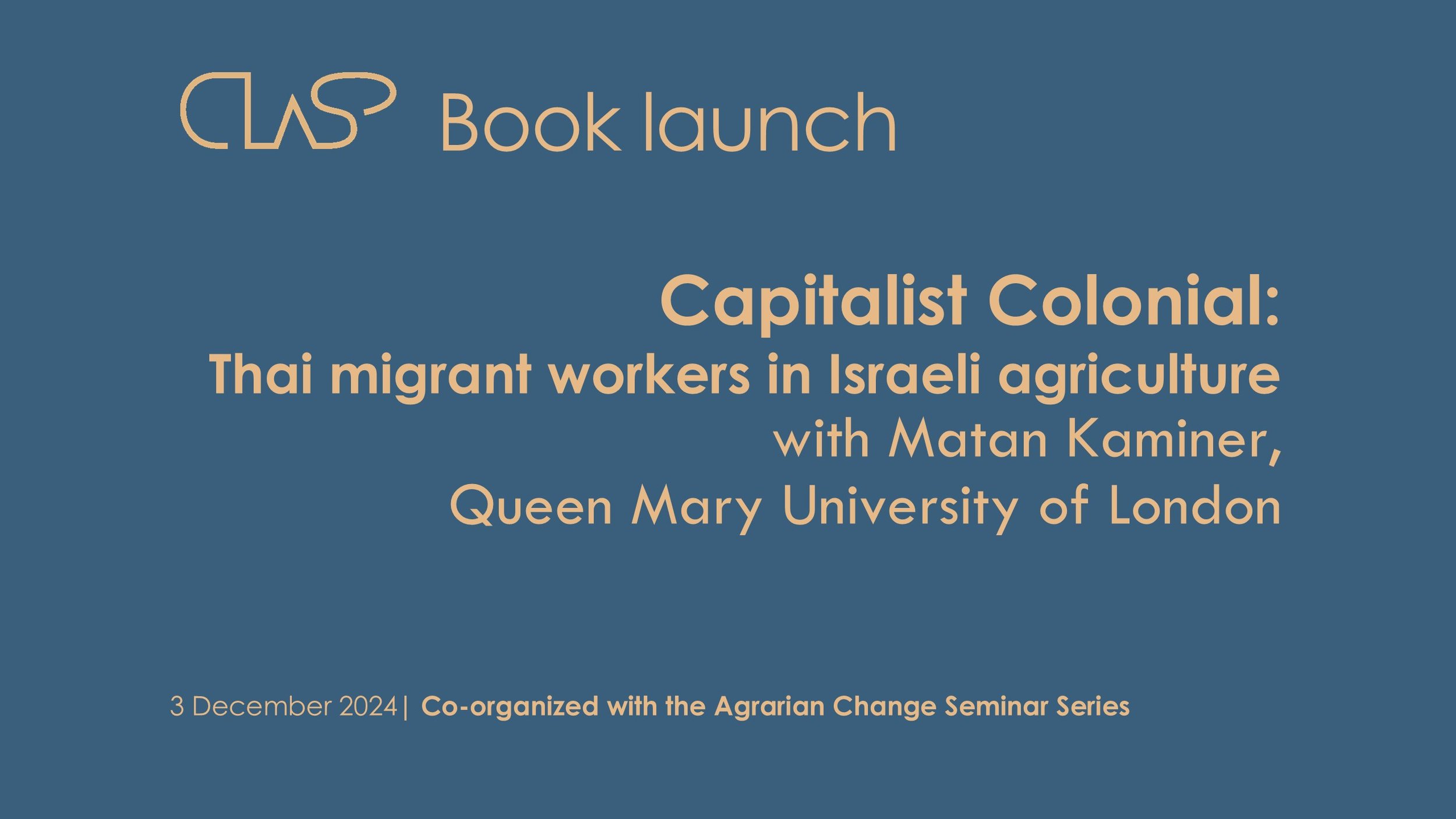
Book Launch of ‘Capitalist Colonial: Thai Migrant Workers in Israeli Agriculture’ by Matan Kaminer
Join CLaSP & Journal of Agrarian Change for a brief presentation of the book which will be followed by a discussion by Dr Alessandra Mezzadri, Reader in Global Development and Political Economy, SOAS (University of London).
The event is hybrid, register here for the zoom link: https://forms.gle/61zmU4qjrxyu7VVY9
Abstract:
For decades, the agricultural settlements of Israel's arid Central Arabah prided themselves on their labour-Zionist commitment to abstaining from hiring outside labor. But beginning in the late 1980s, the region's agrarian economy was rapidly transformed by the removal of state protections, a shift to export-oriented monoculture, and an influx of disenfranchised, ill-paid migrants from northeast Thailand (Isaan). Capitalist Colonial, Matan Kaminer's ethnography of the region and its people, argues that the paid and unpaid labour of Thai migrants has been essential to resolving the clashing demands of the bottom line and Zionist ideology here as elsewhere in Israel's farm sector.
Kaminer's account mobilizes capitalism and colonialism as a combined analytical frame to comprehend the forms of domination prevailing in the Arabah. Placing the findings of fieldwork as a farm labourer within the ecological, economic, and political histories of the Arabah and Isaan, Kaminer draws surprising connections between the violent takeover of peripheral regions, the imposition of agrarian commodity production, and the emergence of transnational labour flows. Insisting on the liberatory possibilities immanent in the "interaction ideologies" found among both migrant workers and settler employers and raising the question of the place of migrants who are neither Jewish nor Arab in visions of decolonization, this book demonstrates anthropology's ongoing relevance to the struggle for local and global transformations.
https://www.sup.org/books/anthropology/capitalist-colonial
This event is co-organized with the Agrarian Change Seminar Series, convened by the Journal of Agrarian Change.
Matan Kaminer is an anthropologist and a Lecturer at the School of Business and Management, Queen Mary University of London.
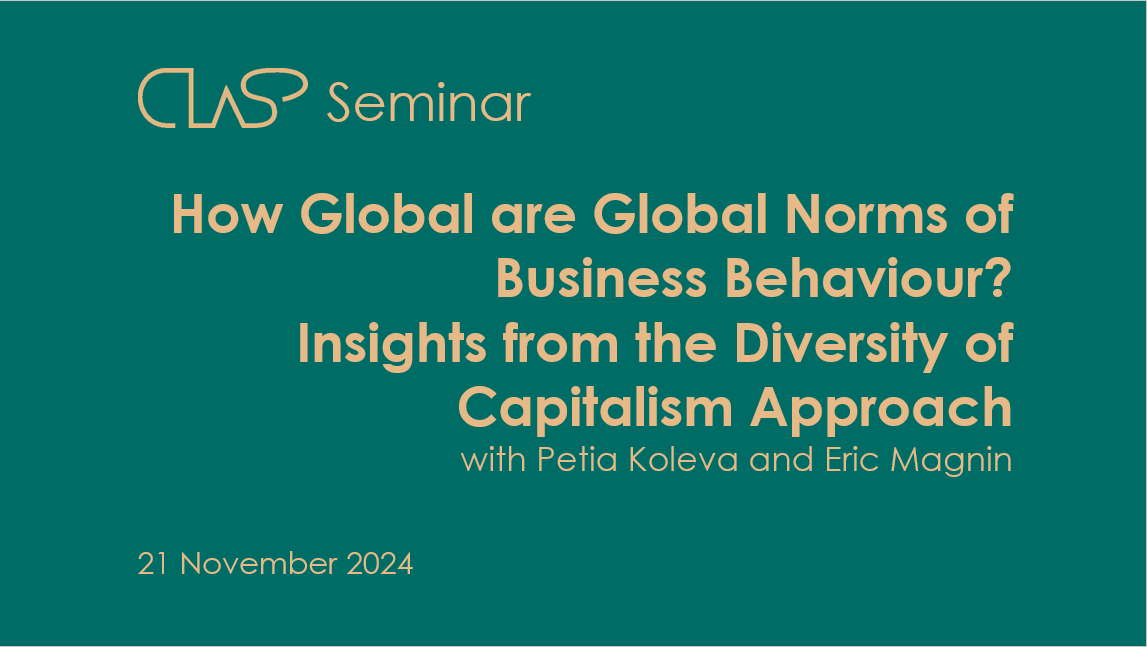
How Global are Global Norms of Business Behavior? Insights from the Diversity of Capitalism Approach
How Global are Global Norms of Business Behavior? Insights from the Diversity of Capitalism Approach
When: Thursday 21st November 2024, 15.00-17.00
Location: Graduate Centre GC101, Mile End Road, London, England, E1 4NS
Speakers: Petia Koleva (Université Paris Cité) and Eric Magnin (Université Paris Cité)
Based on an analytical grid combining organizational and economic theories, this paper contributes to research on global initiatives for environmental, social and ethical responsibility in business activities and their local embeddedness. Taking the example of the United Nations Global Compact and its local networks in Denmark, France, Germany, Japan, Spain and the United States, we discuss the relevance of dichotomous theoretical frameworks such as explicit/implicit CSR to understand the initiative’s dynamics in various geographical contexts. The theoretical affinity between explicit/implicit CSR distinction and the variety of capitalism approach is critically assessed in the light of the five models of capitalism typology elaborated by Amable (2003). We show in what way the dissemination of the UNGC by its local networks contributes to the emergence of differentiated hybrids, reflecting the diversity of national institutional arrangements of CSR and the underlying model of capitalism. The uniform and globalizing character of the UNGC has therefore not erased the national differences which are indeed present in the local UNGC networks. This is reminiscent of the idea that the globalization of goods and capital has not led to the disappearance of nations and national specificities. From a theoretical point of view, this observation merges with one of the founding ideas of Régulation theory, the diversity of national trajectories in time and space.
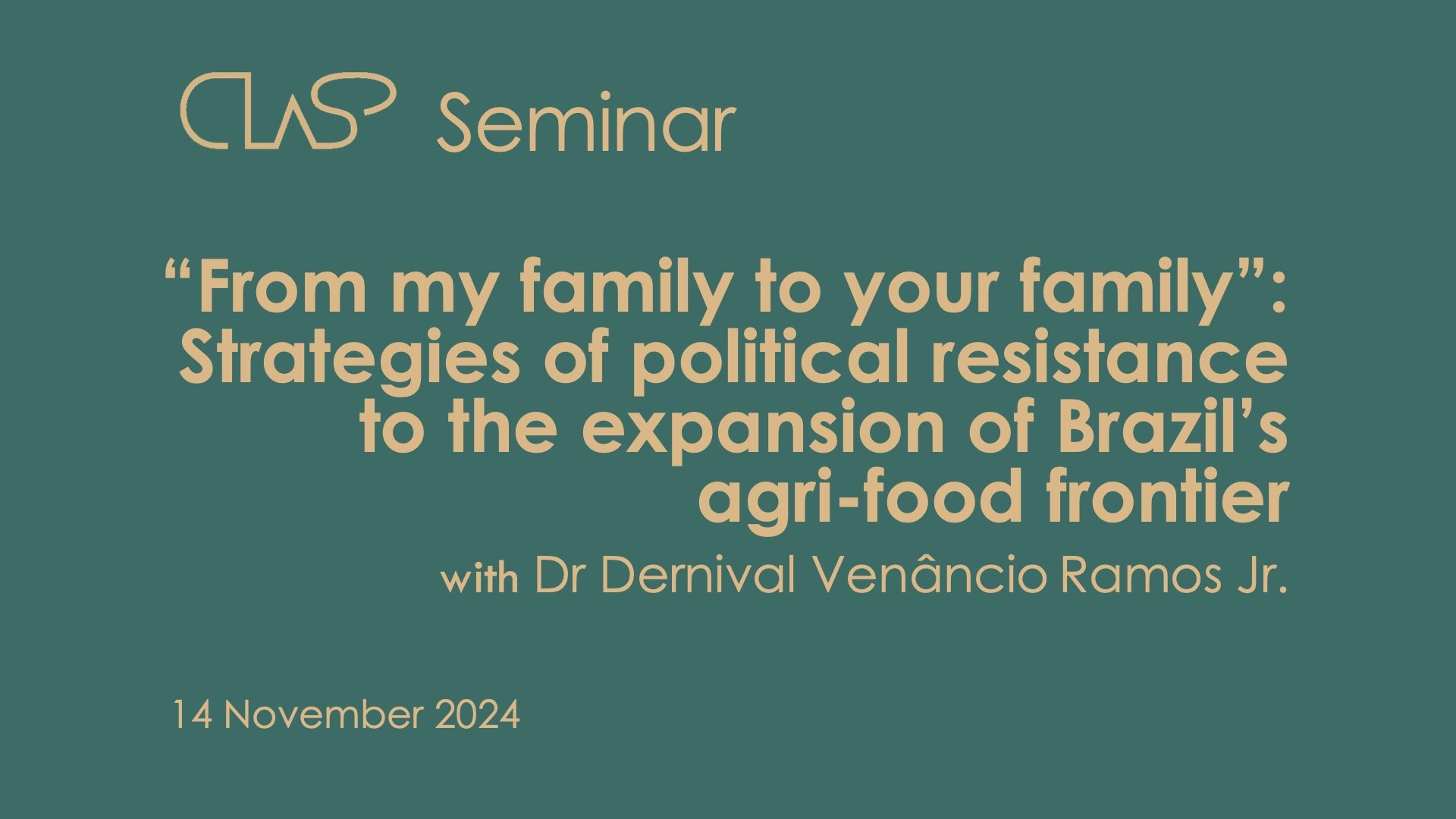

Participatory Research Methods Workshop
Join us for a half-day workshop to explore experiences, challenges and theoretical possibilities emerging from the use of participatory research methodologies. The workshop will draw on the work of researchers applying PAR (participatory action research) and other participatory methodologies in diverse, interdisciplinary and global research projects. We will share and explore different understandings and traditions of participatory research across geographic contexts, the practicalities of designing and undertaking participatory projects and the challenges (and joys!) of building and maintaining relationships for this work. We will also examine the ways in which participatory methodologies can help shape knowledge production and influence activist agendas within and beyond academia.
The workshop will begin with short (5 minute) presentations from researchers using participatory methodologies in different contexts, including IHSS Visiting Fellow Dr Venâncio Ramos, who will speak about his experiences using participatory methodologies with agrarian social movements and indigenous, quilombola and small farming communities in the Southern Brazilian Amazon. This will be followed by small group work, sharing and discussion on the themes above. Tea, coffee and cakes provided!
This workshop is hosted by QMUL’s Centre on Labour, Sustainability and Global Production (CLaSP) and the Institute for the Humanities and Social Sciences (IHSS)
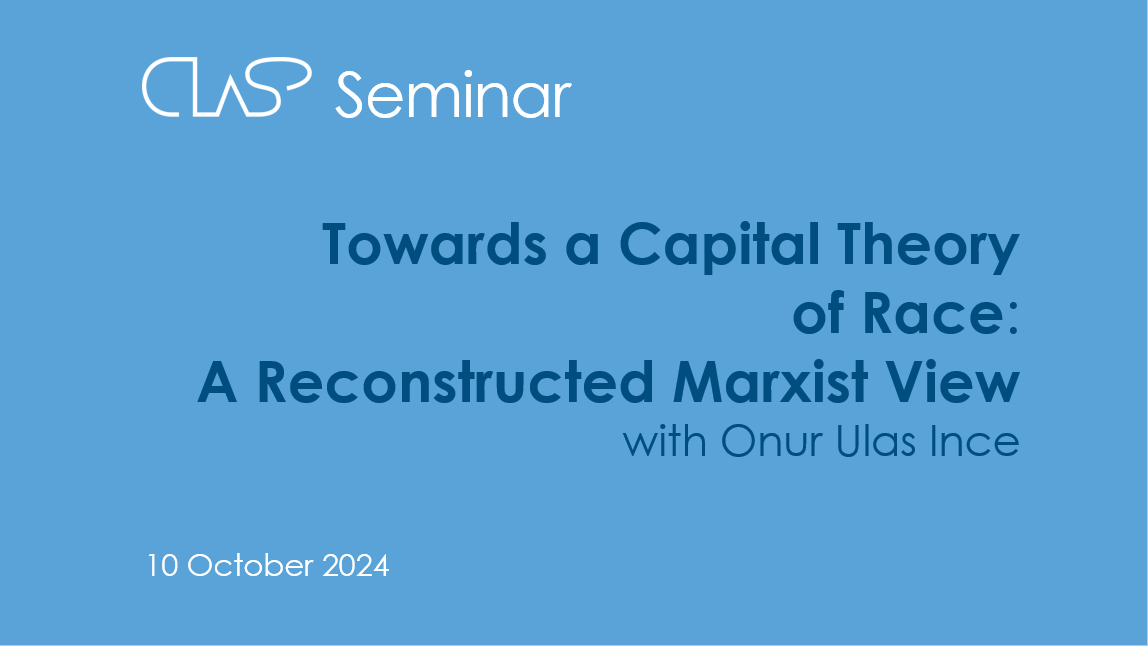
Towards a Capital Theory of Race: A Reconstructed Marxist View
Towards a Capital Theory of Race: A Reconstructed Marxist View
Onur Ulas Ince (SOAS)
Please join us for this Seminar with Onur Ulas Ince, SOAS, London UK. The seminar will be held on the 10th of October between 4.00 to 6.00 pm in Arts Two Room 3.16, in Mile End Campus, Queen Mary University of London.
This talk outlines the preliminary arguments of a chapter from an ongoing book project, entitled Before the Global Color Line: Empire, Capital, and Race in Asia, 1800-1850. The chapter develops the notion of “capitalist racialization,” an analytic concept that captures the role of capitalist social forms in shaping the semantic content and evaluative of racial hierarchies. Making a case for the co-constitution of capitalist and racial orderings of difference, I distinguish “capitalist racialization” from, on the one hand, civilizational critiques of racialism inspired by Cedric Robinson, and on the other, recent structural theorizations of race as an instrumentality of capital accumulation. Arguing with and beyond the latter, I propose to grasp race as a historically specific formation of embodied difference that is internal to the history of capitalism rather than an ontologically independent mode of domination.
In elaborating this argument, I draw on my previous work on “colonial capitalism” and on critical reappraisals of Marxist social theory that foreground the recoding of social difference, as opposed to its homogenization, as the modus operandi of capitalist expansion and reorganization. I mobilize the Marxist conceptual nomenclature of “formal/real subsumption” and “real abstraction” for sharpening “differentiation-in-commensurability” as the logic of capitalist racialization and the hinge connecting capitalist abstractions to racial abstractions.
A crucial upshot of this reconceptualization is the irreducible historicity of capitalist racialization. Any proper investigation of capitalist racialization, it is argued, necessarily involves the analysis of a concrete capitalist formation and of the specific languages that mediate the racial elaboration of social difference. I illustrate the latter point with reference to the book’s historical research on the construction of proto-racial categories under British colonial capitalism in Asia in the first half of the nineteenth century. Stadial theory of “civilization” and its capitalist codes, I contend, provided the semantic content and ordering principle of colonial striations that would sediment into overtly racial taxonomies in the last third of the nineteenth century.
Please note: a chapter of Ince’s book has been pre-circulated for anyone attending the seminar. If you are attending and would like to pre-read the chapter, please email clasp-info@qmul.ac.uk Kindly do not circulate the chapter further without permission or cite.
Onur Ulas Ince is Senior Lecturer of Political Theory and Political Economy at SOAS University of London. He is the author of the award-winning book, Colonial Capitalism and the Dilemmas of Liberalism (Oxford UP, 2018), which received the 2020 David and Elaine Spitz Prize (ICSPT) and was finalist for the 2020 C. B. Macpherson Prize (CPSA).

Workers' struggles and capitalist strategies: Perspectives from Africa and South America in an age of 'sustainability'
Workers’ struggles and capitalist strategies:
Perspectives from Africa and South America in an age of ‘sustainability’
Workshop organised by Centre on Labour, Sustainability and Global Production
17 and 18 June 2024 at Queen Mary University of London
Programme:
June 17th
10.30 to 13.00: Structures of capital in agriculture, logistics and manufacturing in Africa and South America
15.00 to 17.30: Workers’ creativity, education and the co-production of knowledge of capital
June 18th
10.00 to 13.00: Contours of strategy and struggle from below
14:00: Walking tour by Edward Legon and Jack Sargeant
Even as a sustainability agenda is being mainstreamed across business and policy-making, it is defined predominantly through environmental considerations. This is important but it overlooks the critical social dimension of sustainability. Through a range of events and workshops in recent years, the Centre on Labour, Sustainability and Global Production (CLaSP) has emphasized the need to combine perspectives on ecology and labour for a sustainability agenda that is transformative and not piecemeal and status-quoist.
Building on this past work, the Centre’s end-of-year event in 2024 will focus on an open-ended analysis of struggles and strategies by the ‘labouring classes’ in the contexts of shifting capitalist strategies and varied ecological crises, from global heating to localised crop disease; in other words, it will focus on rethinking structures of capital from below. It will focus on Africa and South America as two of the largest regions of the global South, which is already being disproportionately impacted by climate change, and on varied sectors like agricultural, logistics and manufacturing within them.
We ask: how is environmental change impacting workers across different sectoral and regional contexts? How are the strategies of capital transforming in response to environmental change and demands for just transition? How are workers and their organizations/unions responding to these changes? What kinds of historical legacies of collective action/struggle are shaping their response? What possibilities and contradictions emerge with the loss of key sites of organised working class power as a result of 'sustainability transitions'? What kind of (dis)articulations exist between formal trade unions and informal grassroots organizing and between production and social reproduction? What dilemmas and opportunities exist in building solidarities with subaltern communities who may not see themselves as part of the labouring classes? Finally, what are the strategies for workers’ education being used, what can be learned from different contexts and how can bridge struggles and build wider solidarities?
Held over two days at Queen Mary University of London, the event will consist of two panels on Monday 17 June from 10.30 to 17.30, and a roundtable on 18 June from 10.00-13.00, ending with an East London walking tour at 14.00. We are keen that attendees engage actively in this event. As such, we recommend that people attend both days because the format is designed to build iteratively on each other and maintain continuity in discussions.
Speakers include:
Angela Dziedzom Akorsu, School for Development Studies. University of Cape Coast, Ghana
Maurizio Atzeni, CEIL/CONICET Argentina and Facultad de Economía y Negocios, Universidad Alberto Hurtado, Chile
Dario Azzellini, Autonomous University of Zacatecas, Mexico.
Jörg Nowak, Universidade de Brasilia, Brazil
Rose Omamo, General Secretary, Amalgamated Union of Kenya Metal Workers, Kenya
Julia Soul, National Scientific and Technical Research Council, CEIL/Centro de Estudios e Investigaciones Laborales, TEL/Taller de Estudios Laborales, Argentina
Dzodzi Tsikata, Department of Development Studies, SOAS, University of London
Attendance is free and in-person only, please register in advance here:
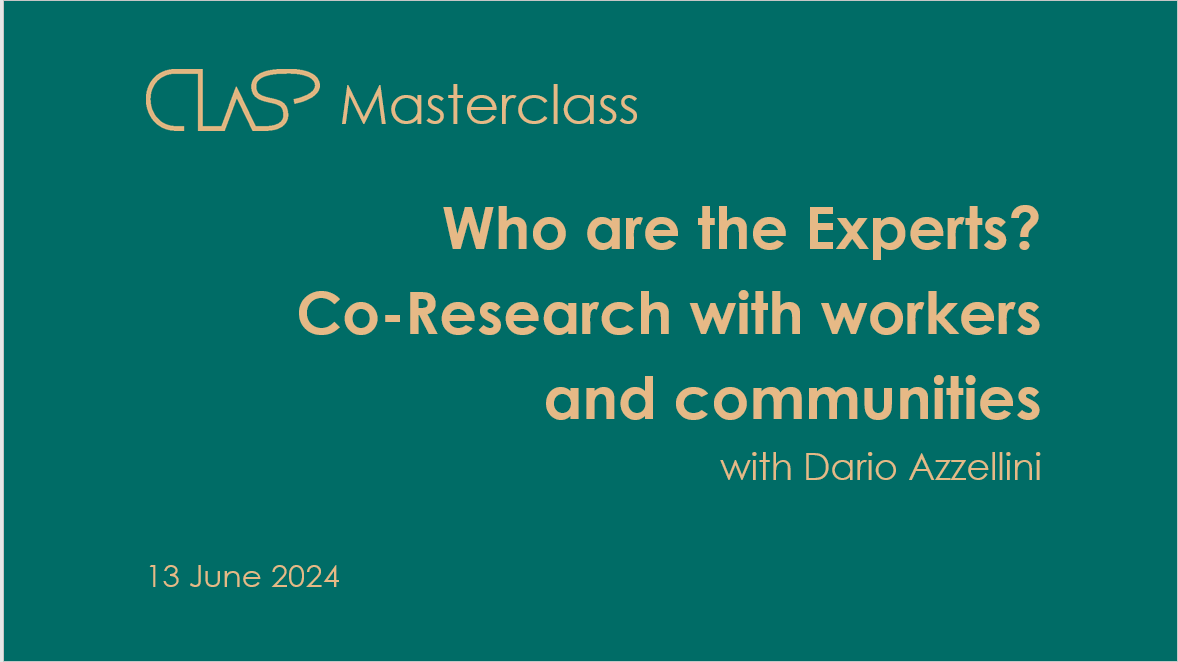
Who are the Experts? Co-Research with workers and communities
Who are the Experts? Co-Research with workers and communities
Please join us for a Masterclass on Co-researching methods with workers and communities with Dario Azzellini, Autonomous University of Zacatecas, Mexico. The masterclass will be held on the 13th of June between 3.00 to 5.00 pm in Queens QB-213, in Mile End Campus, Queen Mary University of London.
Co-research, action research, participatory research and several more terms refer to research in which the researcher engages supposedly with some kind of collective knowledge production. But what is what, and what makes sense for whom? How can they be intertwined with methods as observation and fieldnotes, oral history, interviews (individual and focus group), and visual methods? Furthermore, there are several issues that I would like to consider and we as researchers should hold as constant questions throughout all of our work and discussions. These issues are those of class, “race,” gender relations, power, position, subjectivity and ethics. Methods are inherently relational and, as such, they are produced through and embedded in hierarchies of class, race, gender, ethnicity and nationality that should be reflexively addressed, though they can never be “resolved.” These hierarchies will produce tensions, and how you deal with those tensions will define your work. I will be giving insights from my experience with participatory research.
Dario Azzellini is Political scientist, sociologist, author, and filmmaker at the Autonomous University of Zacatecas (Zacatecas, Mexico). He lived in different Latin American countries and is now based in the USA, Mexico and Berlin. His studies focus on labour, social movements, self-management, sustainability and just transition and global political economy. He has conducted research into social transformation processes for more than 30 years with a special focus on Latin America and Europe. He has published 11 films, and more than 20 books and 100 journal articles and book chapters, many of which have been translated into various languages. He authored Communes and Workers’ Control in Venezuela: Building 21st Century Socialism from Below (Brill 2017), co-authored Commoning Labour and Democracy at Work: When Workers Take Over(forthcoming), and co-edited the Handbook of Research on the Global Political Economy of Work (2023). More information is available on his personal website at: www.azzellini.net.
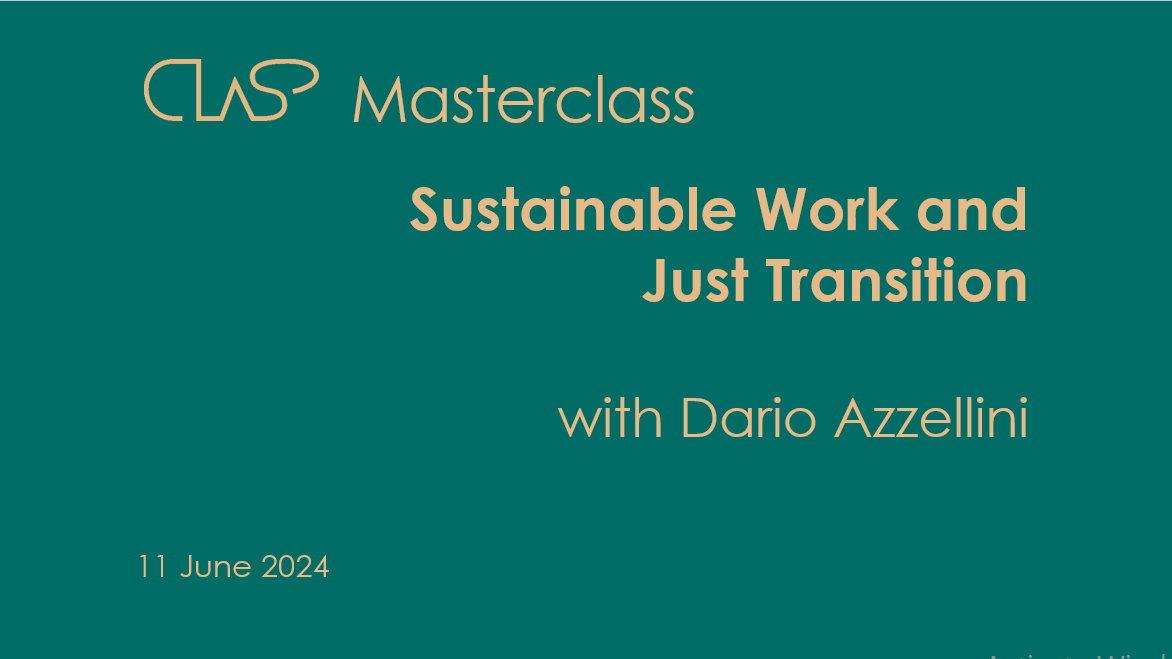
Sustainable Work and Just Transition
Sustainable Work and Just Transition
Please join us for a Masterclass on Sustainable Work and Just Transition with Dario Azzellini, Autonomous University of Zacatecas, Mexico. The masterclass will be held on the 11th of June between 3 and 5pm in the Graduate Center building, room GC201, in Mile End Campus.
There is a scientific consensus on the need to keep the global temperature increase below 1.5 degrees Celsius. Governments and capital focus on changing consumption and production patterns, but want to keep everything as it is. In production, the focus is on the “technological fix”. Technology and recycling are important for socio-ecological transformation. However, they have already failed as a solution to the environmental crisis. Changing production and consumption patterns alone will not lead to the necessary socio-ecological transformation. Employment and labour markets are already changing, and we need to ensure that work itself becomes sustainable in all its aspects.
What is sustainable work? First of all, “sustainable work” is part of the 17 Sustainable Development Goals (SDGs) of the UN for 2030, adopted in 2016, which should be included in global, EU-wide and national policies, but this is not happening with regard to sustainable work. Sustainable work is a holistic approach. It involves looking at economic, social, and environmental issues as an interrelated whole. Moreover, in order for the socio-ecological transition to be a just transition, different levels need to be taken into account. These include social security for those directly affected by job loss, as well as class, North-South relations, and gender. If workers do not take a central role in defining and practicing the transformation, it will not happen.
Dario Azzellini is Political scientist, sociologist, author, and filmmaker at the Autonomous University of Zacatecas (Zacatecas, Mexico). He lived in different Latin American countries and is now based in the USA, Mexico and Berlin. His studies focus on labour, social movements, self-management, sustainability and just transition and global political economy. He has conducted research into social transformation processes for more than 30 years with a special focus on Latin America and Europe. He has published 11 films, and more than 20 books and 100 journal articles and book chapters, many of which have been translated into various languages. He authored Communes and Workers’ Control in Venezuela: Building 21st Century Socialism from Below (Brill 2017), co-authored Commoning Labour and Democracy at Work: When Workers Take Over(forthcoming), and co-edited the Handbook of Research on the Global Political Economy of Work (2023). More information is available on his personal website at: www.azzellini.net.
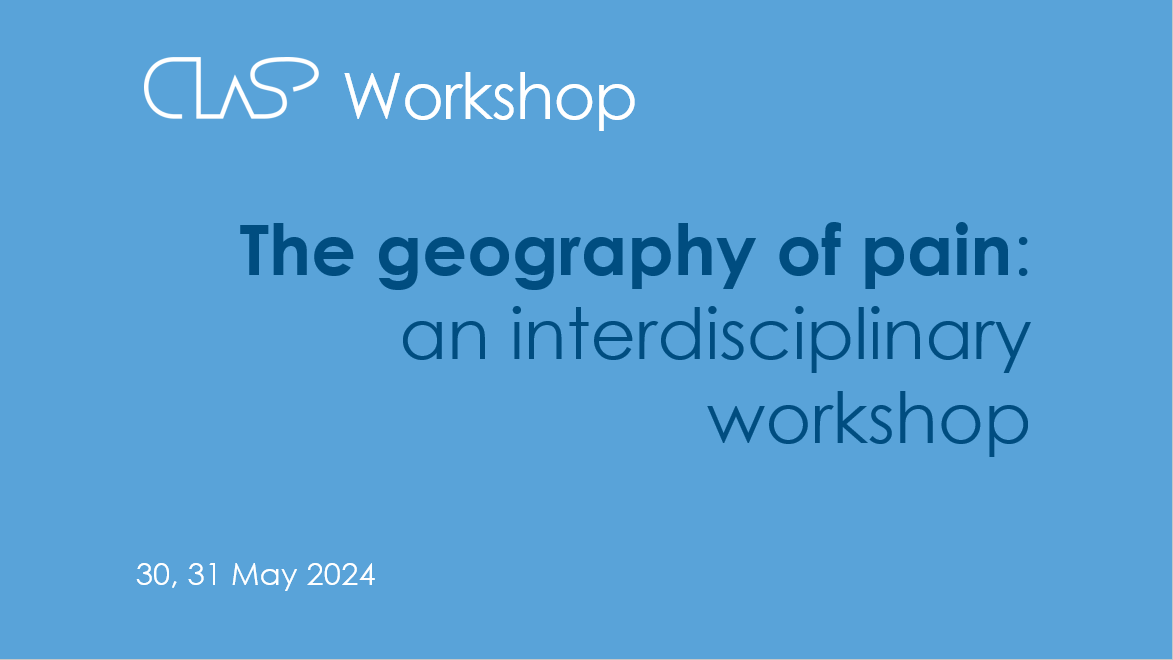
The geography of pain: an interdisciplinary workshop
The geography of pain: an interdisciplinary workshop
This workshop will bring together researchers and practitioners to explore the spatial, social, environmental, and embodied geographies of pain and anaesthetics.
Identifying pain as a zone of interface between the body and the world, this workshop will investigate the meaning, role, and dynamics of pain, affliction, and suffering in the context of planetary crisis and contemporary capitalism. Thinking of pain as unevenly distributed, differentially experienced, and historically and socially produced, the workshop begins from the premise that a great variety of academics and practitioners have a stake in improving our understanding of pain, and how it is made and unmade in and between bodies.
The workshop will have two parts:
The first part (Thursday, 30 May 2024, 16:00 -20:00) will be an interdisciplinary forum, bringing people together to discuss different understandings of pain. We seek perspectives from the biomedical sciences, the humanities, and the social sciences, as well as from health practitioners, trade unionists, artists, activists, performers, and more. The workshop will be open, informal, and discursive. We seek to create new conversations and collaborations around pain and its social, spatial, and embodied circulations.
The second part (Friday, 31 May 2024, 9:00 - 17:00) will focus on the relationship between pain, global capitalism, space, and environments. We invite short research papers from across disciplines on the following, non-exhaustive, list of topics:
Pain and suffering in historical and contemporary systems of labour, production and social reproduction;
Analyses of pain and suffering at the intersection(s) between the biomedical and social sciences, the humanities, and ecology and the environment;
Geographical studies of pain and suffering;
The relations between race, caste, gender, sexuality, dis/ability, and pain;
Interdisciplinary approaches to the history, science, use and misuse of painkillers, analgesics, and opioids;
Critical perspectives from across disciplines and spheres of practice on the treatment of pain;
Interdisciplinary approaches to the epistemology and ontology of pain.
Please submit a 200-word abstract to a.davies@qmul.ac.uk. If you would like to contribute to the second part of the workshop in a different medium (visual art, performance, case study, etc), you would be welcome to do so. Please email the organisers with any further questions.
Please register here to attend. You are invited to come to all or part of the workshop.
A small number of travel and accommodation bursaries will be available for early career / unwaged researchers and practitioners. Workshop organised in association with the QMUL School of Geography, the Centre on Labour, Sustainability and Global Production (CLaSP), and the Institute for Humanities and Social Sciences.
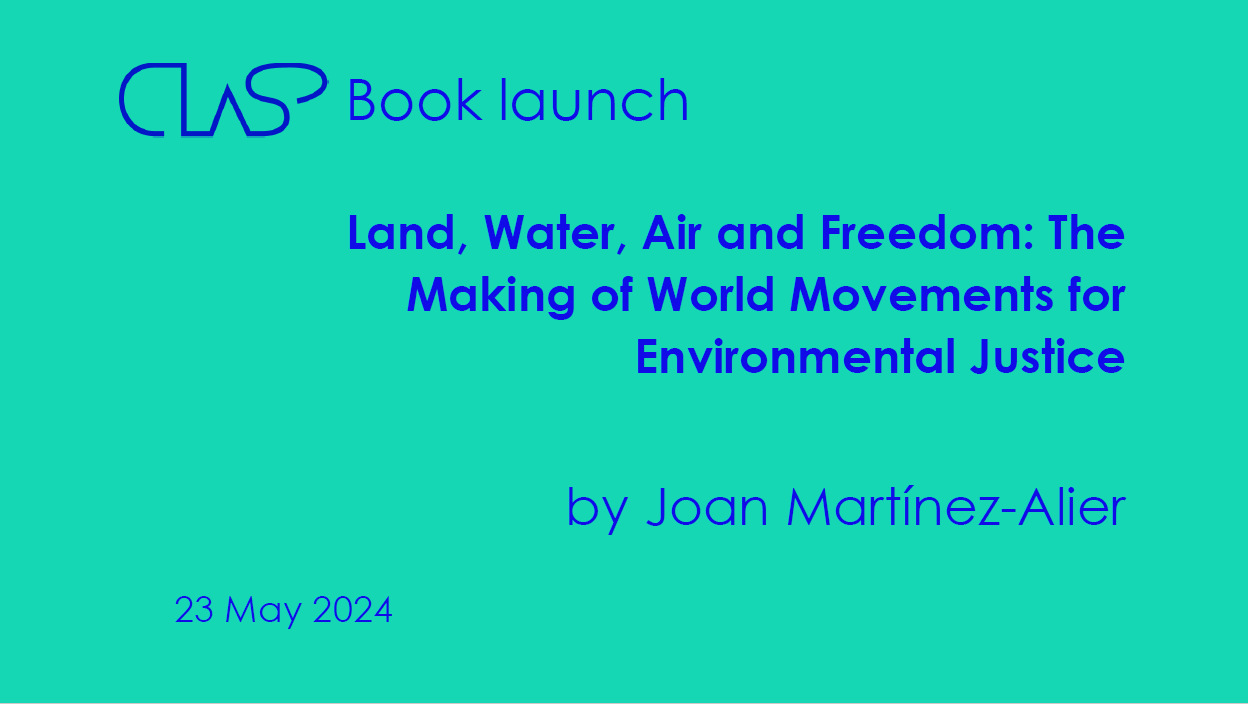
Book launch: Land, Water, Air and Freedom: The Making of World Movements for Environmental Justice
Book launch: Land, Water, Air and Freedom: The Making of World Movements for Environmental Justice
By Joan Martínez-Alier in conversation with Dr Paula Serafini (CLaSP)
This ground-breaking book makes visible the global counter-movement for environmental justice, combining ecological economics and political ecology. Using 500 in-depth empirical analyses from the Atlas of Environmental Justice (EJAtlas), Martínez-Alier analyses the commonalities shared by environmental defenders and offenders respectively. The book reveals the enormous “entropy hole” at the centre of the industrial economy, and traces “ecological distribution conflicts” at the frontiers of commodity extraction and waste disposal. It also serves as a textbook on Global Comparative Political Ecology based on the EJAtlas, a collection of “ecological distribution conflicts” (EDC) that began in 2012 and reached 4,000 entries by March 2024.
This is an open access title available under the terms of a CC BY-NC-ND 4.0 License. It is free to read, download and share on Elgaronline.com
About the author: Joan Martinez-Alier is an Emeritus Professor of Economics and Economic History, and senior researcher at ICTA UAB. He was awarded a Balzan prize in 2020 and the Holberg prize in 2023 as a scholar of ecological economics, political ecology and environmental justice. He was a research fellow at St. Antony’s College, Oxford between 1963 and 1973, and 1984-85. He published Ecological economics: energy, environment, and society (1987); Varieties of environmentalism: Essays North and South (1997) with Ramachandra Guha; and The Environmentalism of the Poor: A Study of Ecological Conflicts and Valuation (2003). He co-edited the textbook Ecological Economics from the Ground Up (2013) and directed the EJOLT project (2011-15). He has co-directed about 40 doctoral theses as mentor of the Barcelona School of Ecological Economics and Political Ecology. He was co-founder (1990) and president of the International Society for Ecological Economics (2006-2007). In 2016, he was awarded an ERC Advanced Grant for the project EnvJustice, and he co-directs the Atlas of Environmental Justice.
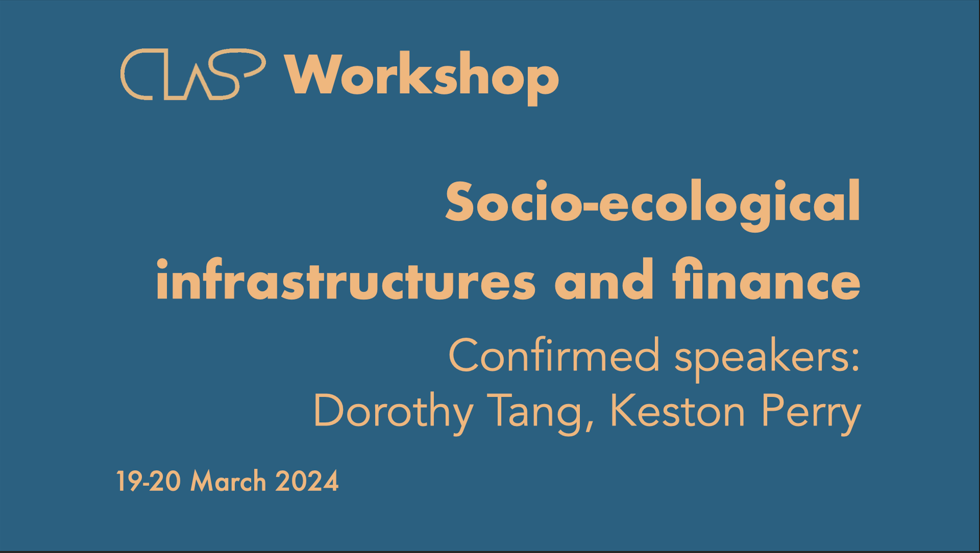
Socio-Ecological Infrastructures and Finance
This two-day workshop will bring together diverse scholars working at the intersection of finance, sustainability, and infrastructures, broadly defined to include both physical infrastructure and wider social and ecological dynamics. Invited speakers will lead debate on the entanglements of finance, race, gender, and colonial legacies in contemporary forms of economic and ecological crisis.
Programme and locations
Day 1: 19th March, 2-5pm at WCH Garrod: 2.35, Turner St, London E1 2AD
Day One of the workshop will explore how these scholars have brought different critical perspectives to bear on themes encompassing infrastructure imaginations, socio-ecological impacts of transnational flows of infrastructure investment, the global political economy of climate finance and governance, and everyday experiences of debt and structural dispossession, in communities across Southeast Asia, Latin America and the Caribbean.
Day 2: 20th March, 3-5pm at Graduate Centre: GC604, Mile End Campus, QMUL, London E1 4NS
Day Two of the workshop will explore methodologies for the study of these processes, drawing on the experiences of our key speakers, and of ECR scholars at QMUL currently engaged in empirical research on finance and socio-ecological infrastructures across different geographies.
Confirmed speakers Dorothy Tang (Assistant Professor, National University of Singapore) and Keston Perry (Assistant Professor, UCLA)
Organisers: Isadora Cruxên, Mary Robertson and Jessica Sklair
We hope to see you there!

Book Launch: ‘Hottest of the Hotspots: The Rise of Eco-precarious Conservation Labor in Madagascar’ by Benjamin Neimark
CLaSP, Queen Mary Institute for the Humanities and Social Sciences (IHSS) and the POLLEN London-Node invite you to the book launch of Hottest of the Hotspots: The Rise of Eco-precarious Conservation Labor in Madagascar.
About the book:
Continually recognized as one of the “hottest” of all the world’s biodiversity hotspots, the island of Madagascar has become ground zero for the most intensive market-based conservation interventions on Earth.
This book details the rollout of market conservation programs, including the finding of drugs from nature—or “bioprospecting”—biodiversity offsetting, and the selling of blue carbon credits from mangroves. It documents the tensions that exist at the local level, as many of these programs incorporate populations highly dependent on the same biodiversity now turned into global commodities for purposes of saving it. Proponents of market conservation mobilize groups of ecologically precarious workers, or the local “eco-precariat,” who do the hidden work of collecting and counting species, monitoring and enforcing the vital biodiversity used in everything from drug discovery to carbon sequestration and large mining company offsets.
Providing a voice for those community workers many times left out of environmental policy discussions, this volume proposes critiques that aim to build better conservation interventions with perspectives of the local eco-precariat.
https://uapress.arizona.edu/book/hottest-of-the-hotspots
Special Guest Discussant: Professor Sian Sullivan, Bath-Spa University
Chaired by: Shreya Sinha
Sponsored by: Centre for Labour and Sustainable Production (CLaSP), School of Business Management, Queen Mary, University of London, Institute for Humanities and Social Sciences and Political Ecology Network, POLLEN, London-Node
About the Author:
Benjamin Neimark is a Senior Lecturer at the School of Business and Management, and a Fellow at the Institute of Social Science and Humanities (IHSS) at Queen Mary University of London. Benjamin is a human geographer and political ecologist (defined as the intersections of ecology and a broadly defined political economy) whose research focuses on politics of biological conservation and resource extraction, high-value commodity chains, ‘green’ precarious smallholder production, and agrarian change and development. He has a geographic focus on Sub-Saharan Africa and Madagascar. His current research looks at the US military as a global climate actor and, more broadly, the environment footprints of the world’s militaries.
Sian Sullivan is Professor of Environment and Culture at Bath Spa University. She is interested in discourses and practices of difference and exclusion in relation to ecology and conservation. She has carried out long-term research on conservation, colonialism and cultural heritage in Namibia (www.futurepasts.net and www.etosha-kunene-histories.net), and also engages critically with the financialisation of nature (see www.the-natural-capital-myth.net). She has co-edited Political Ecology: Science, Myth and Power (2000), Contributions to Law, Philosophy and Ecology: Exploring Re-embodiments (2016), Valuing Development, Environment and Conservation: Creating Values that Matter (2018), and Negotiating Climate Change in Crisis (2021).
You can also join via Zoom, please register here: https://bit.ly/3SKM4vk

Sustainability for finance: situating green bonds in the financialization of Brazilian agriculture
Green bonds are financial instruments similar to fixed-income securities, with the specificity of being issued to finance environmentally sustainable activities, products and assets, such as forest recovery, energy efficiency projects, storage of greenhouse gas emissions, conservation of water resources, etc. In her presentation, Vanessa Perin will discuss the state of the agribusiness green bond market in Brazil, as well as its connection to the recent coming together of agricultural financing and the capital market in the country. The talk will explore how the very possibility of issuing green bonds related to Brazilian agribusiness is embedded in a longer trajectory of financialization of its agriculture, and how this has been shaping the notion of sustainability mobilized by these financial instruments.
Vanessa Perin holds a Ph.D. in Cultural Anthropology from the Federal University of Rio de Janeiro and is currently a postdoctoral fellow at the Graduate Program in Social Anthropology at the Federal University of São Carlos, Brazil. Her research addresses technical and financial mechanisms that have been enabling the expansion of agribusiness ventures in Brazil, particularly in the soybean supply chain.

Me(a)tabolism and political ecology: labour, land & beef extract
In this presentation of work in progress, Archie will explore the interconnections between the emergence of the global meat industry, and the political ecology of metabolism. Tracing the history of metabolic thinking to Justus von Liebig and his meat extract company, the talk will explore how British imperialist private land-ownership and an emerging international division of labour defined the internationalisation of meat in the early 20th century.
Archie Davies is a cultural and historical geographer working across the fields of political ecology and the history and philosophy of geography. His research addresses food, hunger, nature, race, and embodiment. He has written about the coloniality of infrastructure, the racial division of nature, the history of landscape thinking, and the idea of socio-ecological metabolism. He also works on the history of Brazilian geographical ideas, and his book Josué de Castro and the History of Geography was published by Liverpool University Press in 2022. He is a translator of Brazilian radical ideas, and his collaborative translation with Christen Smith and Bethania Gomes of the Black feminist Beatriz Nascimento's collected works has just been published by Princeton University Press as The Dialectic is in the Sea: The Black Radical Thought of Beatriz Nascimento. He is currently working on a global history of meat extract.

Plantation Crisis: Ruptures of Dalit Life in the Indian Tea Belt
Drawing on thirty months of extensive ethnographic fieldwork in the Peermade and Munnar tea belts of the South Indian state of Kerala, Plantation Crisis explores the collapse of the plantation system and the abandonment of its workforce during the recent crisis in the Indian tea economy. The colonial era plantation system in India – and its two million strong workforce – has, since the mid-1990s, faced a series of ruptures due to neoliberal economic globalisation. In the South Indian state of Kerala, otherwise known for its labour-centric development initiatives, the Tamil speaking Dalit workforce, whose ancestors were brought to the plantations in the 19th century, were at the forefront of this crisis, which has profound impacts on their social identity and economic wellbeing. Out of the colonial history of racial capitalism and indentured migration, Plantation Crisis offers a complex understanding of how processes of social and political alienation unfold in moments of economic rupture. A major argument of Plantation Crisis is that the economic crisis connected with global developments has intensified what may be described as non-economic cultural processes in the continuing abjection of plantation Tamils.
This event is co-organized with the Agrarian Change Seminar Series, convened by the Journal of Agrarian Change
Jayaseelan Raj is Senior Lecturer of Anthropology and Development at King's College London, and a Fellow in the GRNPP at SOAS, University of London. He is the author of Plantation Crisis: Ruptures of Dalit Life in the Indian Tea Belt (UCL Press, 2022), and co-author of Ground Down by Growth: Tribe, Caste, Class and Inequality in Twenty-First Century India (Pluto Press, 2017). His research and writings focuses on plantation system and labour, caste, class, gender and ethnicity, agrarian capitalism and migration, and state and Dalit question in India.

Bringing in the capitalist state: critical agrarian studies, crisis tendencies & progressive strategy in the imperial core
Internationalist strategy and praxis remain crucial in our times of perma-crisis across the heartlands and peripheral spaces of global capital. Key barriers to an internationalist politics that takes sovereignty and self-determination for all peoples seriously are those centres of overwhelming resistance to progressive transformation within the imperial core: agricultural producers and communities. For self-determination to be possible in the capitalist peripheries, the agricultural systems of the core will require transformation. First, we examine the ways in which developed capitalist agricultural sectors’ emerging ‘green transition’ strategies attempt to draw on state powers and resources to support re-invigoration of their conditions of production. Second, we can look to how these strategies meet the existing socio-ecological care labour frameworks and state forms that have emerged in response to earlier regimes of accumulation. The paper concludes with some reflections on what these dynamics may imply for programmatic political agendas, looking beyond capitalist agricultural sectors toward organising coalitions across formal and informal movements, and into the state.
Anna Sturman is a Postdoctoral Research Fellow at the Sydney Environment Institute at the University of Sydney. Her research centres on the political economy of climate change, particularly focusing on the intersections of theories of the state, non-human nature and value.

Workers’ Inquiry and Co-Research: History, theory & practice
This workshop co-hosted by CLaSP and the Notes from Below collective, will focus on the historical and theoretical developments, and political implications of militant workers’ inquiry.
Developed first by Marx and other members of the International Workingmen’s Association of the 1860s as a tool for information gathering, solidarity, and political transformation of the oppressed classes, it became a practice of militant coresearch between workers and militant intellectuals in Italy’s industrial north almost a century later.
Join us to engage with Francesca Ioannilli (Un cane in chiesa. Militanza, categorie e conricerca di Romano Alquati 2020), Clark McAllister (Karl Marx’s Workers’ Inquiry: International History, Reception and Responses 2022), Gigi Roggero (Italian Operaismo: Genealogy, History, Method 2023), and Jamie Woodcock (Troublemaking: Why You Should Organise Your Workplace 2023) who will discuss the historical roots, theoretical shifts and political implications of this set of practices.

Carbon Fetishism: Towards a Critical Theory of Climate Capitalism by Steffen Böhm
The global climate crisis, which is now stark and clear to see, has brought together an alliance of social movements, NGOs, policymakers and progressive people within corporate sectors to instigate a transition towards ‘climate capitalism’. Climate capitalism’s response to the climate crisis is to commodify nature, in this case, carbon dioxide and a range of other greenhouse gases (GHG), buying and selling the commodity for profit. In this paper, I analyse these developments through the lens of the term ‘fetishism’, which plays an important role in Marx’s understanding of the workings of capital as well as in Freud’s analyses of the human psyche. Critical theorists such as Benjamin and Adorno have been keen to synthesise Marxian and Freudian analyses for a long time, and this paper is the latest attempt to make such historical analyses relevant to today’s moment of crisis. What we are currently witnessing is the attempt to change capital’s accumulation as well as enjoyment practices, away from fossil fuels towards renewable energy, ‘net-zero’ and other ‘green growth’ imaginaries. This paper aims to develop concepts to help us understand and historically position these capital developments in the age of climate capitalism.
Steffen Böhm is Professor in Organisation & Sustainability at University of Exeter Business School. He was previously Professor in Management and Sustainability at the University of Essex. He’s also held visiting positions at Uppsala University, Swedish University of Agricultural Sciences, Uppsala, Sweden, as well as at the Federal University of Rio Grande do Sul, Brazil, and St Andrews University, Scotland. His research focuses on the political economy & ecology of the sustainability transition. He has published six books: Repositioning Organization Theory (Palgrave), Against Automobility (Wiley-Blackwell), Upsetting the Offset: The Political Economy of Carbon Markets (Mayfly), The Atmosphere Business (Mayfly), Ecocultures: Blueprints for Sustainable Communities (Routledge), and Negotiating Climate Change in Crisis (Open Book Publishers). The book Climate Activism (Cambridge) is forthcoming. More details at steffenboehm.net

Book Launch: When Nothing Works: From cost of living to foundational liveability
CLaSP and Accounting & Accountability Research Group (AARG) at the School of Business and Management, QMUL jointly invite you to the book launch of When Nothing Works.
In 2023, the United Kingdom has unaffordable essentials, failing public services, rising inflation, and industrial unrest. When Nothing Works is both our national dilemma and the title of this new book which breaks with the assumptions of the left and the right and seeks to change what is economically visible and politically actionable.
When Nothing Works diagnoses chronic foundational failure when all the pillars of household liveability are failing as residual income is squeezed, services collapse, and social infrastructure decays. It proposes a political practice of 'adaptive reuse' that works around the constraints that frustrate mainstream policies of growth and higher wages.
At this event, chaired by Andrew Pendleton, Professor Julie Froud (University of Manchester and one of the authors of When Nothing Works), will outline the book's key arguments, before a panel discussion.
Speakers:
The event will be followed by a short drinks reception to which all attendees are welcome. Discounted copies of the book will be sold after the event.


